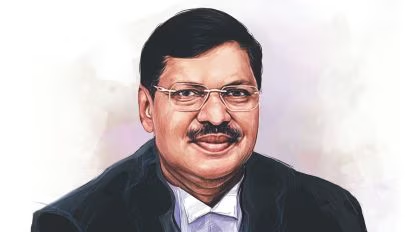Introduction: A Thoughtful Warning from the Chief Justice
In a time when artificial intelligence (AI) is increasingly becoming a part of everyday life, including our legal systems, Chief Justice of India (CJI) Justice B.R. Gavai have expressed caution over its unchecked use. Recently, Justice Gavai, while speaking at an international legal gathering at the University of Cambridge, emphasized the importance of using AI carefully in courts. His main message was simple yet powerful—let AI be a tool for efficiency, but never let it replace the human role in delivering justice.
AI in Courts: Progress So Far
India’s judiciary has been making significant strides in technology adoption. From virtual court hearings during the COVID-19 pandemic to the launch of the National Judicial Data Grid (NJDG) and e-Courts services, technology has made courts more accessible. Innovations like the Supreme Court Vidhik Anuvaad Software (SUVAS), which translates judgments into regional languages, and Artificial Intelligence tools that help with case management, have been game-changers.
Justice Gavai acknowledged this progress. He said that technology has already helped courts reach citizens more effectively, manage case backlogs, and make the system faster. But he also reminded everyone that while the use of such tools is important, we must not cross the line where machines begin to make decisions.
Why AI Cannot Replace Judges
At the core of Justice Gavai’s argument is the belief that justice is more than just a decision—it is a human experience. A court’s judgment often requires compassion, understanding, context, and emotional intelligence—qualities that machines do not possess.
He stated that although AI tools can analyze vast amounts of data and suggest outcomes based on patterns, they cannot understand the emotional or moral aspects of a case. For example, a machine might treat all similar cases in the same way, but a judge can take into account a person’s background, intention, or mental state elements crucial to fair justice.
Justice Gavai warned that allowing AI to take over judicial decisions could create a system where justice is mechanical and impersonal, which would be dangerous for a democracy.
Bias in Algorithms: A Serious Concern
Another major concern Justice Gavai raised was bias in AI systems. AI tools are trained on past data, and if that data includes discrimination or historical injustice, then the AI will likely repeat those same biases.
He gave examples from other parts of the world where facial recognition tools used by law enforcement showed racial bias. In the U.S., for instance, facial recognition technology has been shown to wrongly identify people of color more frequently than white individuals. If such flawed systems are introduced into the Indian judicial process without safeguards, it could harm people instead of helping them.
Hence, he urged the legal community and technologists to work together to build AI tools that are fair, transparent, and accountable.
Safeguarding Privacy in the Digital Age
Justice Gavai also spoke about the importance of protecting personal information. As courts use more digital tools, a large amount of sensitive data—like personal details, case files, and testimonies—is stored online. If not properly protected, this information can be leaked or misused.
He called for strict data protection policies and urged developers to design systems that ensure high levels of security. With the rollout of the Digital Personal Data Protection Act, 2023 in India, there is now a legal framework in place, but its implementation within judicial infrastructure needs close attention.
Digital Divide: Inclusion Remains a Challenge
Another issue he pointed out was the digital divide—the gap between those who have access to technology and those who don’t. While urban lawyers and litigants may find it easier to attend virtual hearings or file documents online, many in rural areas still lack basic internet or digital literacy.
Without inclusive planning, these people risk being left out of the justice system. Justice Gavai emphasized that while embracing technology, the judiciary must also ensure that no one is left behind.
Technology as a Partner, Not a Master
To sum up, Justice Gavai said that AI and automation must be seen as assistants to human judges, not as replacements. He said:
“A judge must always have the final say. AI can support the process, but it must never drive the decision.”
This clear stance is in line with earlier views expressed by other top judges in India, including CJI Chandrachud, who has also spoken about the ethical and constitutional risks of relying too much on automated systems.
Conclusion: A Balanced Way Forward
The speech by Justice Gavai comes at a crucial time when courts around the world are exploring how to use AI for better justice delivery. His message is a timely reminder that technology should serve justice, not override it.
India is leading in many areas of legal tech innovation, but it must now lead responsibly. With balanced use of AI, strong legal safeguards, and a human-centered approach, the Indian judiciary can continue to modernize while staying true to its core duty: to deliver fair, compassionate, and accessible justice for all.
References
- The Law Advice – “CJI B.R. Gavai Warns: ‘Technology Must Not Replace Judicial Functions’” https://www.thelawadvice.com/news/cji-b-r-gavai-warns %E2%80%9Ctechnology-must-not-replace-judicial-functions%E2%80%9D?utm_source=chatgpt.com
- The Wire – “Artificial Intelligence in Judiciary ‘Must be Approached With Caution’: Justice B.R. Gavai”- https://m.thewire.in/article/law/aritificial-intelligence-in-judiciary-must-be-approached-with-caution-justice-b-r-gavai/amp?utm_source=chatgpt.com
- Economic Times/ET Legal – “Technology must complement, not replace, human mind in judicial decision‑making: CJI B R Gavai”- https://lawstreet.co/legal-insiders/cji-gavai-stresses-on-transformative-power-of-technology-in-enhancing-access-to-justice?utm_source=chatgpt.com

